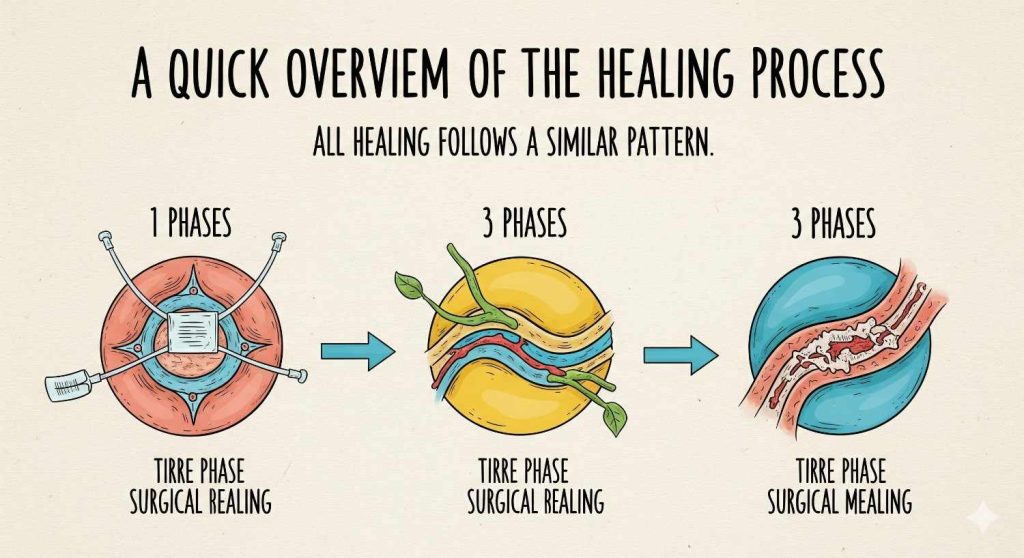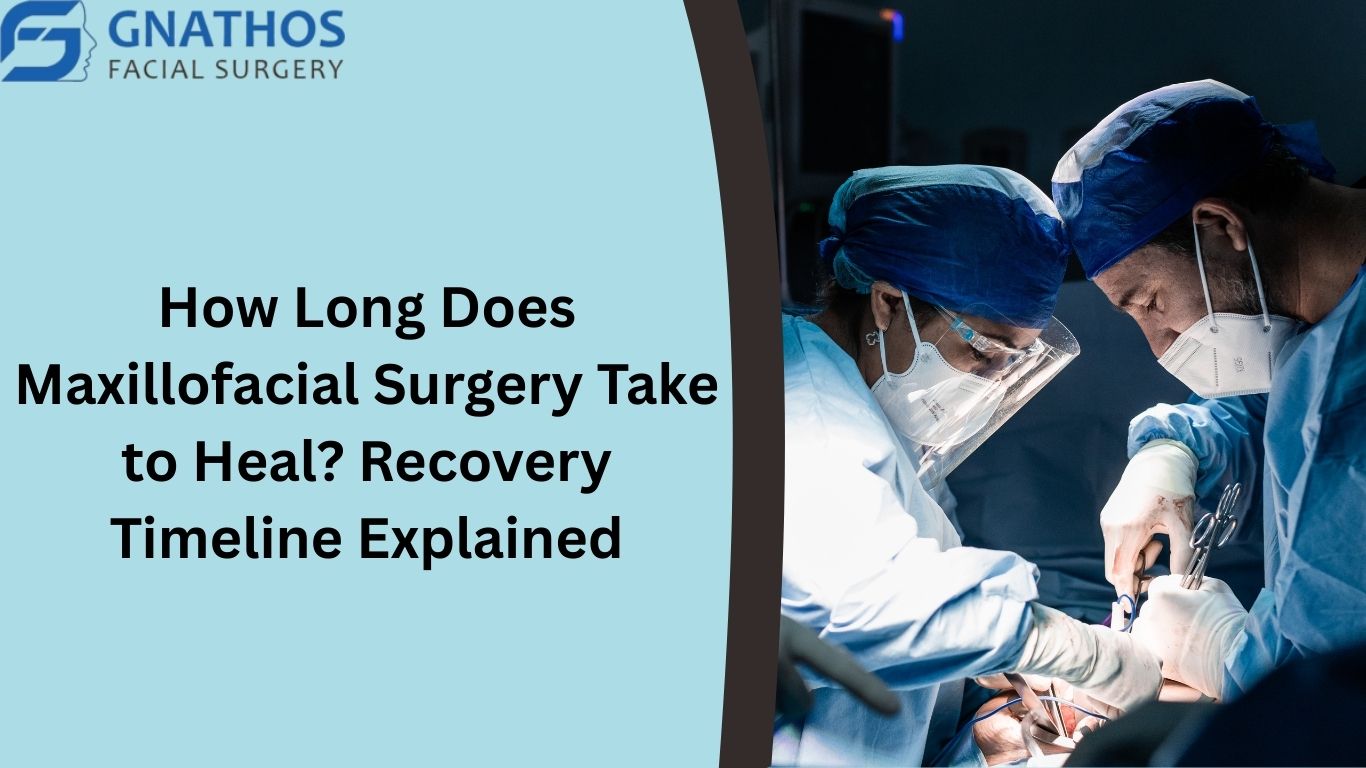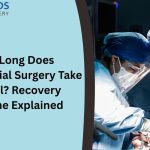If you’re facing a maxillofacial surgery procedure, whether it’s for wisdom teeth, a dental implant, or something more extensive like jaw reconstruction, one of the first and most pressing questions on your mind is undoubtedly: “How long does maxillofacial surgery take to heal?“
It’s a perfectly normal thing to wonder. We all want to know what to expect from the recovery process—the pain, the diet, the time off work, and when we can finally get back to our normal routine. The answer, of course, isn’t a simple number of days or weeks. The recovery timeline for maxillofacial surgery depends heavily on the specific procedure you’re having. A simple tooth extraction is a world away from corrective jaw surgery. Today, we’re going to break down the recovery timelines for some of the most common maxillofacial surgery procedures, so you can have a clear, realistic expectation of your healing journey. Let’s get you the information you need for a smooth and successful recovery.
A Quick Overview of the Healing Process
Before we dive into specific timelines, it’s helpful to understand the general phases of surgical healing. All healing follows a similar pattern:

- Phase 1: The Inflammatory Phase (First 24-72 hours): This is the acute phase. You’ll experience the most swelling, bruising, and discomfort during this time. The body is sending blood and fluids to the surgical site to begin the repair process.
- Phase 2: The Proliferative Phase (Days 3 to 14): Your body starts rebuilding tissue. Swelling begins to subside, and the initial discomfort lessens. You might feel “better” but the new tissue is still very fragile.
- Phase 3: The Remodeling Phase (Weeks 2 to 12+): This is a long-term healing phase. The new bone and soft tissue become stronger and more organized. While you might feel fully recovered on the outside, the internal healing is still ongoing.
The duration of these phases varies dramatically depending on the surgery’s complexity. So, to answer the question, “How long does maxillofacial surgery take to heal?,” we have to look at each procedure individually.
Recovery Timelines for Common Maxillofacial Surgery Procedures
Let’s break down some of the most frequent surgeries and their expected recovery periods, from the simple to the complex.
1. Wisdom Tooth Extraction:
- The Procedure: Removal of wisdom teeth, which may be impacted or fully erupted.
- Immediate Recovery (First 24-48 hours): This is the most challenging part. You’ll experience swelling, some pain, and maybe some bleeding. You’ll need to stick to a liquid-only diet (smoothies, yogurt, broths) and apply ice packs to your cheeks to manage swelling.
- Short-Term Recovery (Days 3-7): Swelling and bruising should begin to subside. Pain will significantly lessen, and you can likely transition to very soft foods like mashed potatoes, scrambled eggs, and well-cooked pasta. You’ll be able to return to work or school within 2-4 days.
- Full Recovery (Weeks 2-4): The extraction sites should be well on their way to healing, and you can generally resume a normal diet and activities. The bone will continue to fill in the extraction site over the coming months, but for all practical purposes, you will feel fully recovered.
- Summary: For wisdom tooth extraction, you’re typically back to your routine in about a week, with full healing in a month.
Wondering How Long Maxillofacial Surgery Takes to Heal?
Recovery timelines can vary depending on the type of surgery, your overall health, and aftercare. Get a personalized recovery plan from our experienced maxillofacial surgeons to ensure faster, safer healing.
Talk to a Maxillofacial Expert2. Dental Implant Placement (Single Implant):
- The Procedure: The surgical placement of a titanium post into the jawbone to act as a tooth root.
- Immediate Recovery (First 24-72 hours): Swelling, some bruising, and mild to moderate discomfort are common. A soft diet is a must. Applying cold compresses and taking prescribed pain medication will help.
- Short-Term Recovery (Days 3-14): The initial swelling and bruising will subside. You can often return to work within a few days. You will need to continue with a soft diet for about a week to 10 days to avoid putting pressure on the surgical site.
- Full Recovery (3-6 Months): This is the long-term, critical healing phase known as osseointegration. The implant fuses with your jawbone. You won’t feel any pain, and you can eat normally, but the process of bone-to-implant fusion takes months. Your final crown or prosthesis is placed only after this fusion is complete.
- Summary: The initial discomfort is short, but the full healing timeline for an implant is several months before it’s ready for a final tooth.
3. Bone Grafting (Sinus Lift or Ridge Augmentation):
- The Procedure: Adding bone volume to the jaw to prepare for a dental implant.
- Immediate Recovery (First 3-7 days): This is similar to implant placement, but often with more swelling and bruising, as the procedure can be more extensive. A soft diet and pain management are crucial.
- Short-Term Recovery (Weeks 2-4): Swelling will decrease significantly. You can likely return to a more normal diet, but your surgeon may still advise caution. All initial symptoms should be gone by the end of this period.
- Full Recovery (4-9 Months): Just like implants, bone grafts require a long period to fully integrate and harden. The bone will need to mature and become strong enough to support an implant. This can take anywhere from 4 to 9 months, depending on the type and amount of graft material used.
- Summary: The initial recovery is a few weeks, but the overall timeline before the next step (implant placement) is a minimum of several months.
4. Corrective Jaw Surgery (Orthognathic Surgery):
- The Procedure: This is a major surgery to reposition the upper jaw, lower jaw, or both to correct a severe bite or facial imbalance.
- Immediate Recovery (First 1-2 weeks): This is the most intensive part of the recovery, and a key factor in answering, “How long does maxillofacial surgery take to heal?” You will be in the hospital for 1-2 nights. Swelling and bruising will be at their peak. Your jaw will be stabilized with wires, bands, or elastics, meaning your mouth will be immobilized, and you will be on a liquid-only diet. You’ll likely be off work or school for 2-4 weeks.
- Short-Term Recovery (Weeks 2-6): Swelling begins to subside, but it will still be noticeable. You’ll transition from a liquid to a very soft, non-chew diet (e.g., purees, scrambled eggs, mashed potatoes). You will likely still have bands holding your jaw together.
- Intermediate Recovery (Weeks 6-12): The jawbones are now stable, and your surgeon will likely start weaning you off the elastics, allowing you to begin gentle jaw exercises and gradually introduce a soft, chewable diet. You will likely feel much more comfortable and be able to resume many normal activities.
- Full Recovery (3-12 Months): This is the long-term healing phase. The bone will continue to consolidate and strengthen, a process that can take up to a year. Swelling will completely disappear. Your orthodontist will be working to fine-tune your bite. You won’t be in pain, and you’ll have full jaw function, but the final, complete healing is a long-term process.
- Summary: The initial recovery from jaw surgery is about 2-4 weeks off work, but full, complete healing can take up to a year.
5. TMJ Surgery (Arthrocentesis vs. Open-Joint):
- The Procedures:
- Arthrocentesis: A minimally invasive flushing of the joint.
- Open-Joint Surgery: A major procedure to repair or replace the TMJ.
- Recovery for Arthrocentesis: This is a quick recovery. You might have a day or two of discomfort and a soft diet, but you can usually return to normal activities within a few days.
- Recovery for Open-Joint Surgery: This is a much longer recovery.
- Immediate (First 1-2 weeks): Swelling and pain are significant. A liquid-only diet is required. You’ll be off work or school for 1-2 weeks.
- Short-Term (Weeks 2-6): Pain and swelling will decrease. You’ll transition to a soft diet and begin physical therapy exercises to regain jaw mobility.
- Full Recovery (2-6 Months): Ongoing physical therapy is often needed for several months to regain full range of motion. The final healing timeline depends on the extent of the surgery.
- Summary: Arthrocentesis is a quick recovery, but open-joint TMJ surgery can be a lengthy process requiring dedicated rehabilitation.
Important Factors Influencing Your Recovery
While these timelines provide a general guide, your individual recovery can be influenced by several key factors:
- Age and Health: Younger, healthier patients tend to heal faster. Underlying conditions like diabetes or a compromised immune system can slow down healing.
- Following Instructions: Adhering strictly to your surgeon’s instructions for diet, hygiene, medication, and activity is the single most important factor for a smooth recovery.
- Smoking: Smoking significantly impedes blood flow and can severely delay healing, increasing the risk of complications.
- Diet and Nutrition: A nutrient-rich diet with adequate protein, vitamins, and minerals is essential for rebuilding tissue and bone.
- Physical Therapy/Exercises: For complex surgeries, performing your physical therapy exercises as directed is crucial for regaining full function and preventing stiffness.
- Complications: While rare, complications like infection, nerve damage, or non-union (where bones don’t heal correctly) can extend the recovery timeline.
Wondering How Long Maxillofacial Surgery Takes to Heal?
Recovery timelines can vary depending on the type of surgery, your overall health, and aftercare. Get a personalized recovery plan from our experienced maxillofacial surgeons to ensure faster, safer healing.
Talk to a Maxillofacial ExpertThe Maxillofacial Surgeon’s Role in Your Recovery
Your Oral and Maxillofacial Surgeon (OMS) is not just there for the surgery; they are your partner throughout the entire recovery journey. They will provide a clear, detailed post-operative plan tailored to your specific needs. They will manage your pain, monitor your healing progress through follow-up appointments, and address any concerns or complications that may arise.
When you’re asking, “How long does maxillofacial surgery take to heal?,” a great OMS will give you a realistic and honest answer, helping you prepare mentally and logistically for the journey ahead. They understand that a successful surgery is only half the battle; a successful recovery is the other half.
For a comprehensive approach to maxillofacial surgery, from initial consultation to the final stages of healing, it’s invaluable to work with a specialist who understands both the surgical procedure and the full recovery timeline. Professionals like Dr. Suresh are dedicated to providing precise surgical care and guiding patients every step of the way to a full recovery. To learn more about what to expect from your specific procedure and to schedule a consultation with Dr. Suresh, you can visit https://gnathosface.com/. Remember, the right expertise not only ensures a successful surgery but also a smooth and predictable healing journey. Trusting your care to a seasoned professional like Dr. Suresh is the best choice you can make.
Frequently Asked Questions (FAQs) About Maxillofacial Surgery Healing
Is the recovery from wisdom teeth removal very painful?
The recovery from wisdom tooth removal is typically not excruciatingly painful, especially when you follow your surgeon’s instructions and take prescribed pain medication. The most intense discomfort, swelling, and bruising usually occur within the first 48 hours, and most patients are able to transition to a soft diet and feel significantly better within a week.
How long after a dental implant can I eat normally?
You will be restricted to a soft diet for about one to two weeks after a dental implant is placed to avoid putting pressure on the surgical site. However, the implant itself needs several months to fully integrate with your jawbone, a process called osseointegration, before a final crown or restoration can be placed and you can resume a completely normal chewing function on that side.
What is the biggest obstacle during recovery from jaw surgery?
The biggest obstacle during recovery from major jaw surgery is typically the swelling and the dietary restrictions. The swelling can be quite pronounced for the first few weeks, and being on a liquid or very soft diet for a significant period requires a lot of patience and planning. The inability to chew can be mentally and physically challenging for many patients.
Can I go back to work or school soon after maxillofacial surgery?
The time you need off work or school depends on the complexity of your surgery. For simple procedures like a wisdom tooth extraction, you can likely return within 2-4 days. For more extensive surgeries like corrective jaw surgery, you will need a minimum of 2-4 weeks off to allow for initial healing and to manage swelling and dietary limitations.
How important is a soft diet after maxillofacial surgery?
Following a soft diet after maxillofacial surgery is critically important for successful healing. Chewing puts stress and strain on the surgical site, which can delay healing, increase pain, and in the case of jaw fractures or orthognathic surgery, can even compromise the stability of the bones or implants, potentially leading to complications and a longer overall recovery time.
Will I need physical therapy after my surgery?
Physical therapy is often a crucial part of the recovery process after more extensive maxillofacial surgeries, particularly for corrective jaw surgery or open-joint TMJ surgery. A physical therapist will provide you with specific exercises and stretches to help you regain full range of motion, strengthen your jaw muscles, and prevent stiffness, ensuring you achieve the best possible long-term functional outcome.
Wondering How Long Maxillofacial Surgery Takes to Heal?
Recovery timelines can vary depending on the type of surgery, your overall health, and aftercare. Get a personalized recovery plan from our experienced maxillofacial surgeons to ensure faster, safer healing.
Talk to a Maxillofacial Expert











